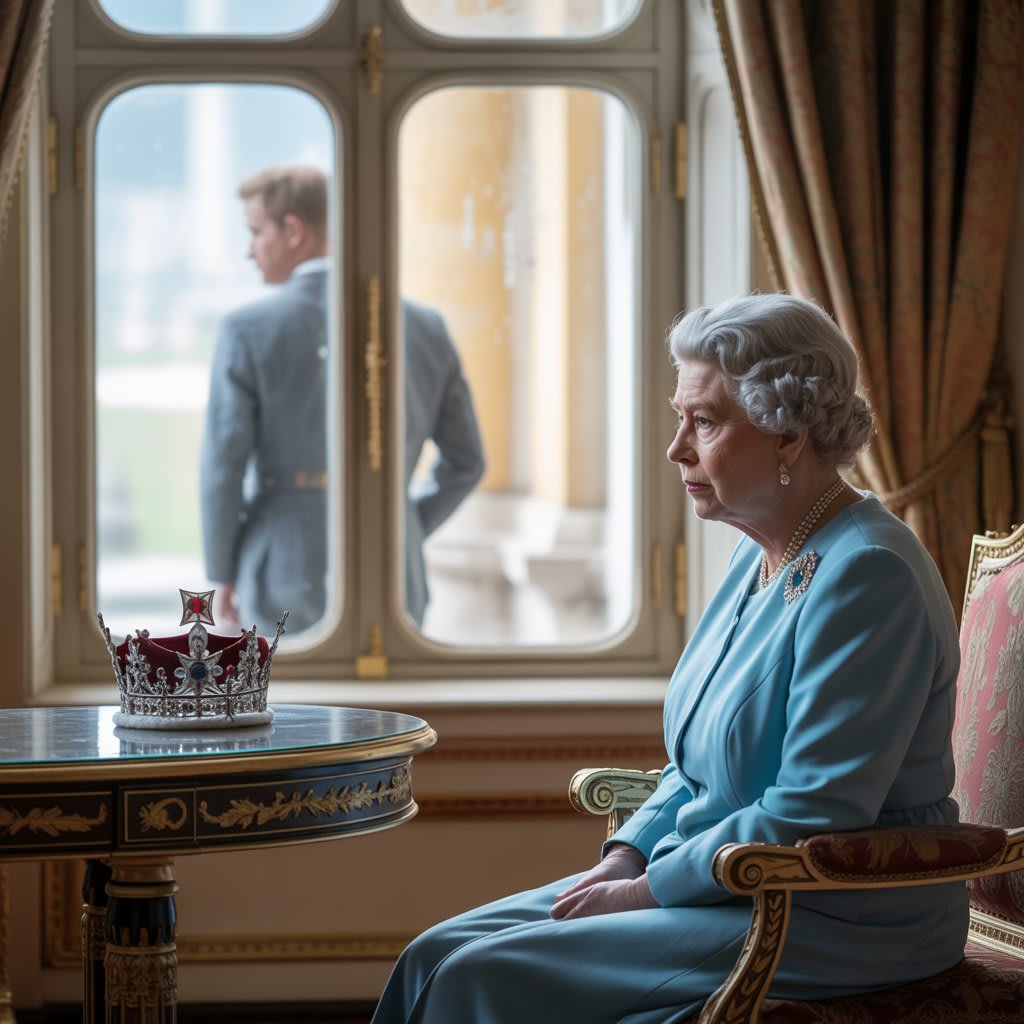There was a time when Prince Harry and Queen Elizabeth appeared inseparable. Photos of them laughing together, Harry cracking jokes at royal events, the Queen gamely participating in a promo video for the Invictus Games—all of it painted a picture of warmth, trust, and special connection between grandmother and grandson. But as it turns out, not all royal stories end with grace and unity.
According to sources within Buckingham Palace, a seemingly small incident—a phone call—spoke volumes about how much things had changed. One day, Harry phoned from the U.S., requesting to speak with the Queen. In the past, such calls were routine. The operator would announce who was calling, the Queen would politely acknowledge it, and the call would proceed. But this time, the Queen said nothing. Just a long, chilling pause.
That silence wasn’t just awkward—it was symbolic. A moment so brief, yet so telling, it made the palace operator uncomfortable enough to interject and connect the call herself. For those familiar with the Queen’s composed demeanor, that hesitation was a seismic shift.
Rewind a few years, and their relationship was still intact. Harry often spoke about his unique closeness with his grandmother. He claimed he confided in her about matters he couldn’t discuss with anyone else. He said he wanted to ensure she was protected, surrounded by the right people. In public, he cast himself as a loyal grandson—misunderstood perhaps, but never disloyal.
But actions tell a different story.
When Harry and Meghan announced their decision to step back from royal duties in 2020, they did so through Instagram. Not a family meeting, not a private conversation—social media. The Queen reportedly found out the same way the public did. It wasn’t just the decision that stung, it was the manner in which it was delivered. The Queen, known for her deep sense of duty and protocol, was blindsided.
Over the next few years, Harry’s public image remained that of a royal trying to speak truth to power. In interviews, he repeatedly emphasized his bond with the Queen. But behind the palace walls, insiders began to notice changes in her demeanor. Fewer mentions of Harry, fewer invitations extended, and a noticeable emotional retreat.
According to respected royal journalist Richard Kay, the Queen was deeply hurt—not just disappointed, but wounded by the way events unfolded. Kay, who had connections to Princess Diana and decades of experience covering the royal family, wrote that Queen Elizabeth dreaded calls from Harry in her later years. That brief phone pause, he suggested, wasn’t an isolated moment—it was the echo of emotional damage too profound to voice.
Sally Bedell Smith, an American royal historian, backed this narrative. Speaking with those close to the Queen, she learned that Harry and Meghan’s departure wasn’t viewed merely as a public relations headache. It was a personal loss. The Queen, already navigating the pandemic and the failing health of Prince Philip, was weighed down by this family rift.
The Oprah interview in 2021 only deepened the divide. Accusations of racism, claims of neglect, and media firestorms followed. Though Harry and Meghan clarified that neither the Queen nor Prince Philip had made the controversial comments, the damage was done. The Queen’s measured silence in response was telling. She never engaged in public rebuttals, but those around her noted her growing fatigue.
There was also a quiet contradiction in how Harry spoke about his grandmother. While claiming a close bond, he simultaneously distanced himself from the rest of the royal institution—criticizing the very system that defined her reign. Meghan and Harry’s Netflix docuseries added more fuel to the fire. They spoke of pain, misunderstanding, and a lack of support—painting a portrait of estrangement, while still holding on to the idea of royal affection.
For the Queen, who had spent her life embodying tradition and stability, this dual narrative became emotionally exhausting. Her staff reported she would avoid certain topics, or grow visibly weary when Harry and Meghan were mentioned. She hadn’t turned cold—but she had begun to protect herself.
Perhaps the most tragicpart of this story is its emotional relatability. Family rifts happen everywhere. Miscommunication, public versus private expectations, and the hurt of watching loved ones drift away—these aren’t exclusive to royalty. But in this case, the consequences were magnified by fame and duty.
In her final years, Queen Elizabeth reportedly still held hope. Not for full reconciliation, perhaps, but for understanding. She wasn’t angry—anger wasn’t her way. But she was tired. And when the phone rang one day and her grandson’s name appeared on the screen, she didn’t respond out of joy or curiosity—but hesitation.
That pause, just a few seconds long, may have spoken more clearly than any public statement or press release ever could.
It was the sound of a heart quietly breaking.
